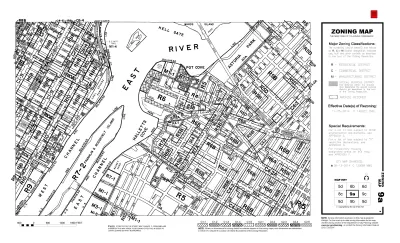Federal oversight of zoning reforms could coordinate efforts across agencies and shoulder some of the political backlash to local zoning changes.

“Balancing America’s lopsided housing markets — where wealthy neighborhoods block new housing while poorer places shoulder churn and displacement — means rethinking the codes that allowed these patterns to take hold. To accomplish this, the White House is looking to see if it has more leverage with city and county governments than it found with congressional lawmakers,” writes Kriston Capps in Bloomberg CityLab.
But with the current structure of the government, local leaders looking to reform zoning in their towns don’t have a centralized federal office to go to for resources. The solution? “The White House just might need a zoning czar.”
According to Capps, “Solving exclusionary zoning will require nimble, silo-busting thinking from across agencies devoted to housing, transportation, financing, veterans, rural and tribal communities and even the environment.” Capps acknowledges that “Since the federal government has no authority over local zoning codes, its tools are limited to carrots or sticks to encourage cities and counties to adopt reforms.” As such, “A federal zoning office could be a body like the U.S. Interagency Council on Homelessness, which was established (by statute) in 1987 to coordinate efforts to address homelessness across some 19 different federal agencies.”
Capps continues, “While exclusionary zoning must be understood as a racial justice concern, it is also a matter of regulatory burdens that limit business, growth and freedom of opportunity. A zoning czar could frame it both ways.” And “Perhaps more importantly, such an office could start to attack the political problems associated with zoning reform.”
FULL STORY: Does the White House Need a ‘Zoning Czar’?

Maui's Vacation Rental Debate Turns Ugly
Verbal attacks, misinformation campaigns and fistfights plague a high-stakes debate to convert thousands of vacation rentals into long-term housing.

Planetizen Federal Action Tracker
A weekly monitor of how Trump’s orders and actions are impacting planners and planning in America.

In Urban Planning, AI Prompting Could be the New Design Thinking
Creativity has long been key to great urban design. What if we see AI as our new creative partner?

King County Supportive Housing Program Offers Hope for Unhoused Residents
The county is taking a ‘Housing First’ approach that prioritizes getting people into housing, then offering wraparound supportive services.

Researchers Use AI to Get Clearer Picture of US Housing
Analysts are using artificial intelligence to supercharge their research by allowing them to comb through data faster. Though these AI tools can be error prone, they save time and housing researchers are optimistic about the future.

Making Shared Micromobility More Inclusive
Cities and shared mobility system operators can do more to include people with disabilities in planning and operations, per a new report.
Urban Design for Planners 1: Software Tools
This six-course series explores essential urban design concepts using open source software and equips planners with the tools they need to participate fully in the urban design process.
Planning for Universal Design
Learn the tools for implementing Universal Design in planning regulations.
planning NEXT
Appalachian Highlands Housing Partners
Mpact (founded as Rail~Volution)
City of Camden Redevelopment Agency
City of Astoria
City of Portland
City of Laramie





























